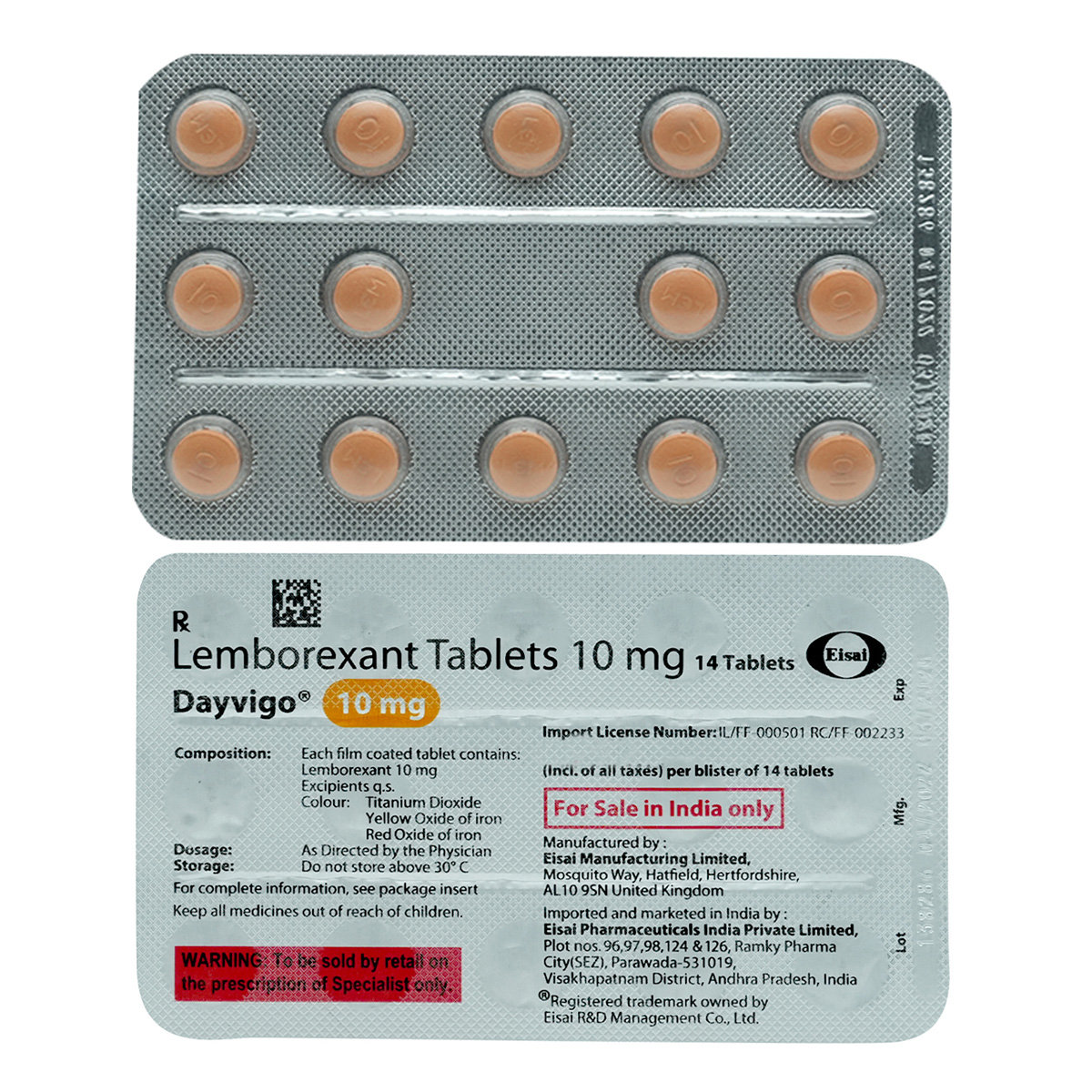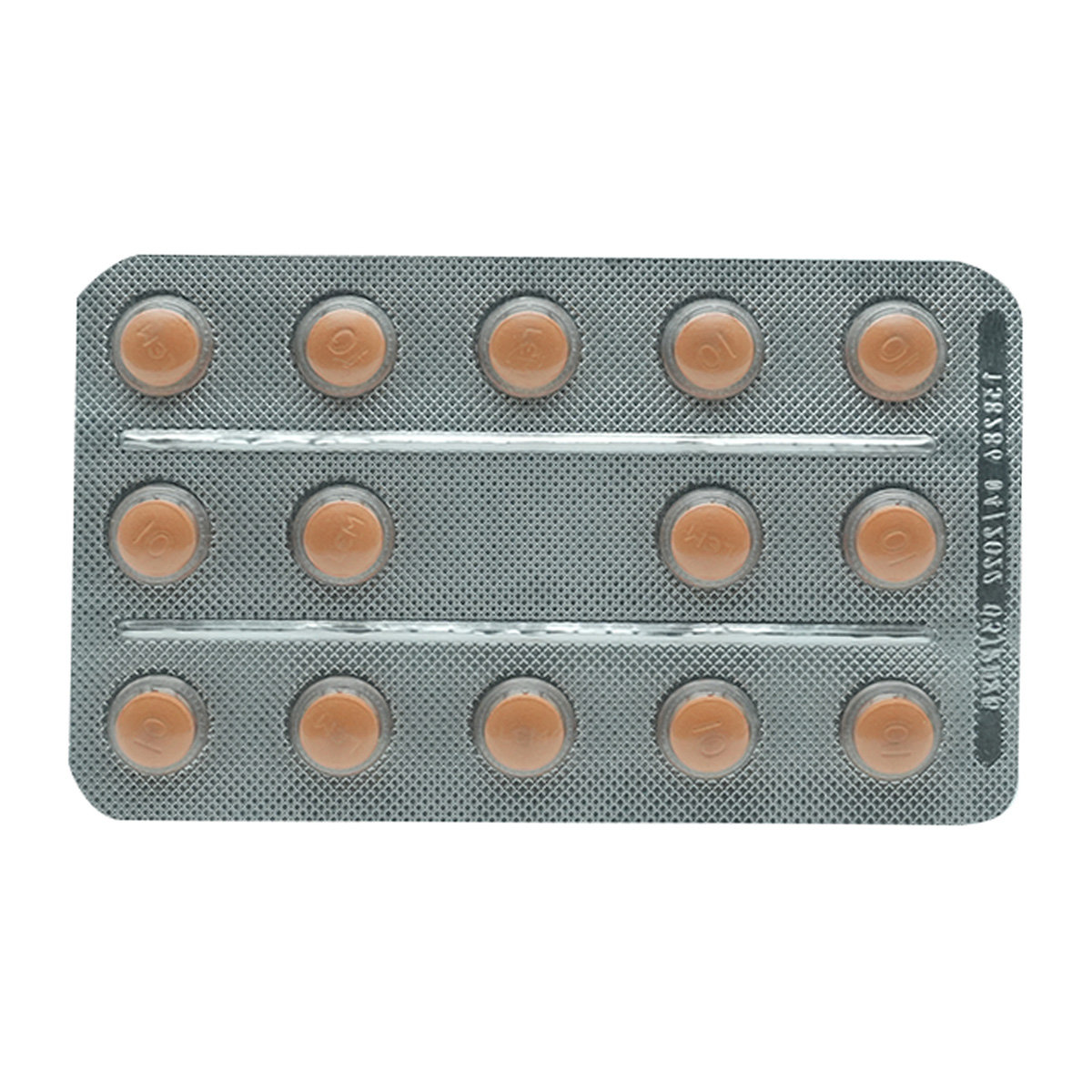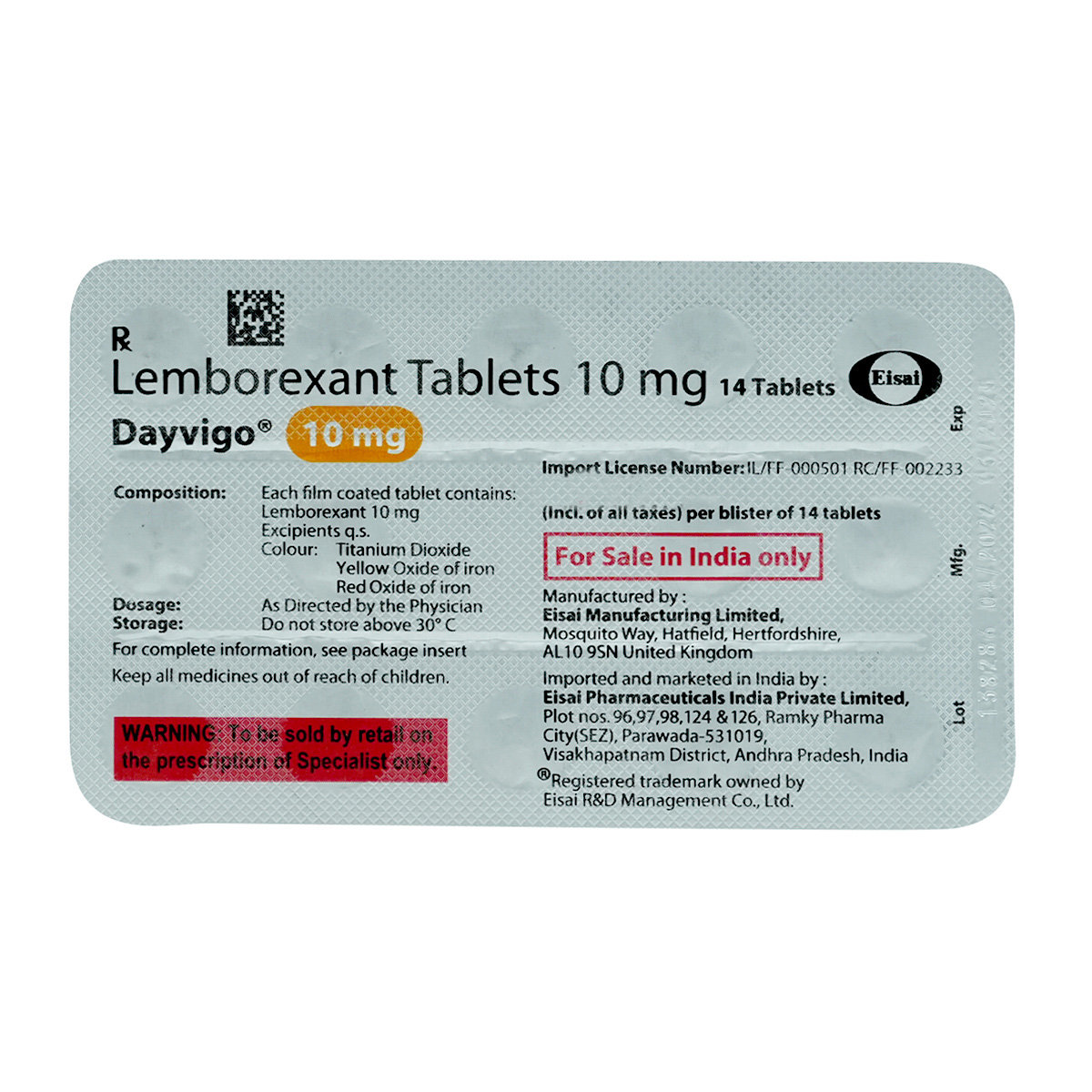Dayvigo 10 mg Tablet 14's
MRP ₹892.5
(Inclusive of all Taxes)
₹133.9 Cashback (15%)
Provide Delivery Location
Online payment accepted
 Prescription drug
Prescription drugWhats That
 59 people bought
59 people bought Composition :
Manufacturer/Marketer :
Consume Type :
Expires on or after :
Return Policy :
About Dayvigo 10 mg Tablet
Dayvigo 10 mg Tablet belongs to the class of drugs called hypnotics used in the treatment of insomnia (difficulty in falling or staying asleep). Insomnia is a sleep disorder that causes difficulty falling or staying asleep. It may be acute (short-term) or chronic (long-term).
Dayvigo 10 mg Tablet contains Lemborexant, which works by blocking orexin receptors (which play a role in wakefulness) in the brain. Thus, it helps to improve sleep efficiency, reduce sleep latency (the time taken for you to go from being fully awake to sleeping) and lengthen sleep time.
Take Dayvigo 10 mg Tablet as prescribed by your doctor. You are advised to take Dayvigo 10 mg Tablet for as long as your doctor has prescribed it for you based on your medical condition. Dayvigo 10 mg Tablet may cause some side effects, such as drowsiness, headache, or tiredness. Most of these side effects of Dayvigo 10 mg Tablet do not require medical attention and gradually resolve over time. However, if these side effects persist or worsen, please consult your doctor.
If you are allergic to Lemborexant or any other medicines, please tell your doctor. Dayvigo 10 mg Tablet is not recommended for children below 18 years of age. Avoid alcohol consumption while taking Dayvigo 10 mg Tablet as it may increase the risk of serious side effects. Drive only if you are alert, as Dayvigo 10 mg Tablet may cause drowsiness. Avoid taking Dayvigo 10 mg Tablet if you have narcolepsy (fall asleep often at unexpected times).
Uses of Dayvigo 10 mg Tablet
Directions for Use
Key Benefits
Dayvigo 10 mg Tablet contains Lemborexant used in the treatment of insomnia. It blocks orexin receptors (which play a role in wakefulness) in the brain. Thus, it helps to treat insomnia by improving sleep efficiency, reducing sleep latency (the time taken for you to go from being fully awake to sleeping) and prolonging sleep time.
Storage
- Avoid driving or operating machinery or activities that require high focus until you know how the medication affects you.
- Maintain a fixed sleeping schedule, create a relaxing bedtime routine and ensure your sleeping space is comfortable to maximize your sleep quality.
- Limit alcohol and caffeine as these may worsen drowsiness and disturb sleep patterns.
- Drink plenty of water as it helps with alertness and keeps you hydrated and for overall well-being.
- Moderate physical activity can improve energy levels, but avoid intense workouts right before bedtime.
- Hydrate your body: Drink enough water to prevent dehydration and headaches.
- Calm Your Mind: Deep breathing and meditation can help you relax and relieve stress.
- Rest and Recharge: Sleep for 7-8 hours to reduce headache triggers.
- Take rest: lie down in a quiet, dark environment.
- Cold or warm compresses can help reduce tension.
- Stay Upright: Maintain good posture to keep symptoms from getting worse.
- To treat headaches naturally, try acupuncture or massage therapy.
- Over-the-counter pain relievers include acetaminophen and ibuprofen.
- Prescription Assistance: Speak with your doctor about more substantial drug alternatives.
- Severe Headaches: Seek emergency medical assistance for sudden, severe headaches.
- Frequent Headaches: If you get reoccurring headaches, consult your doctor.
- Headaches with Symptoms: Seek medical attention if your headaches include fever, disorientation, or weakness.
- Keep regular sleeping hours.
- Don’t consume nicotine, caffeine, or alcohol in the hours leading up to bed.
- Practice relaxation exercises before bedtime.
- Regular physical activity can promote deeper and better sleep. However, avoid intense exercise within 2-3 hours of bedtime, as it can disrupt your sleep.
- If nightmares continue, cognitive behavioral therapy (CBT) may be a helpful treatment option. Your doctor may recommend CBT to address underlying issues and provide coping strategies to manage nightmares.
- Rest well; get enough sleep.
- Eat a balanced diet and drink enough water.
- Manage stress with yoga and meditation.
- Limit alcohol and caffeine.
- Physical activities like walking or jogging might help boost energy and make you feel less tired.
Drug Warnings
If you are allergic to Lemborexant or any other medicines, please tell your doctor. Dayvigo 10 mg Tablet is not recommended for children below 18 years of age. If you are pregnant or breastfeeding, please inform your doctor before taking Dayvigo 10 mg Tablet . Avoid alcohol consumption while taking Dayvigo 10 mg Tablet as it may increase the risk of serious side effects. Drive only if you are alert, as Dayvigo 10 mg Tablet may cause drowsiness. You are recommended to avoid taking Dayvigo 10 mg Tablet with or immediately after a high-fat and high-calorie meal as it makes it difficult for your body to absorb Dayvigo 10 mg Tablet . Avoid taking Dayvigo 10 mg Tablet if you have narcolepsy (fall asleep often at unexpected times). You are advised not to take Dayvigo 10 mg Tablet if you do not have 7 hours of sleep before being active again. Patients with a history of abuse or addiction to alcohol or other drugs should be monitored carefully as they may be at an increased risk for abuse and addiction to Dayvigo 10 mg Tablet .
Drug-Drug Interactions
Drug-Drug Interactions
Login/Sign Up
Taking Dayvigo 10 mg Tablet with eslicarbazepine may reduce the blood levels of Dayvigo 10 mg Tablet, which may make the medication less effective in treating your condition.
How to manage the interaction:
Although taking Dayvigo 10 mg Tablet and Eslicarbazepine can result in an interaction, they can be taken if prescribed by a doctor. Do not stop using any medications without first talking to your doctor.
Taking Dayvigo 10 mg Tablet with rifampicin may reduce the blood levels of Dayvigo 10 mg Tablet, which may make the medication less effective in treating your condition.
How to manage the interaction:
Although taking Rifampicin together with Dayvigo 10 mg Tablet can result in an interaction, they can be taken together if prescribed by your doctor. Do not stop using any medications without first talking to your doctor.
Coadministration of fentanyl with Dayvigo 10 mg Tablet can increase the risk of side effects.
How to manage the interaction:
Taking Dayvigo 10 mg Tablet with Fentanyl together can result in an interaction, but it can be taken if your doctor has advised it. However, if you experience dizziness, drowsiness, difficulty concentrating, and impairment in judgment, contact your doctor immediately. Do not stop using any medications without talking to your doctor.
Coadministration of Dayvigo 10 mg Tablet with Verapamil may increase the risk or severity of side effects.
How to manage the interaction:
Although taking verapamil and Dayvigo 10 mg Tablet together can result in an interaction, it can be taken if a doctor has advised it. However, if you experience depression, abnormal sleep behaviors, worsening of depression, changes in heartbeat, or headache, consult a doctor immediately. Do not discontinue any medications without consulting a doctor.
Taking Dayvigo 10 mg Tablet with posaconazole may increase the blood levels of Dayvigo 10 mg Tablet. This may increase the risk of side effects.
How to manage the interaction:
Although using Posaconazole and Dayvigo 10 mg Tablet together can result in an interaction, they can be taken together if advised by your doctor. However, contact your doctor if you experience depression, abnormal sleep behaviors, worsening of depression, changes in heartbeat, or headache. Do not stop taking any medications without consulting a doctor.
Coadministration of Phenytoin and Dayvigo 10 mg Tablet may reduce the blood levels of Dayvigo 10 mg Tablet.
How to manage the interaction:
Although there is a possible interaction between Dayvigo 10 mg Tablet and Phenytoin, you can take these medicines together if prescribed by a doctor. If you notice any symptoms, make sure to contact a doctor right away. Do not stop using any medications without a doctor's advice.
Coadministration of Dayvigo 10 mg Tablet and amlodipine may increase the blood levels of Dayvigo 10 mg Tablet.
How to manage the interaction:
Although co-administration of Amlodipine with Dayvigo 10 mg Tablet can result in an interaction, it can be taken if a doctor has advised it. However, consult your doctor if you experience abnormal sleep patterns, worsening of depression, changes in heartbeat, or headache. Do not discontinue any medications without consulting a doctor.
Co-administration of Dayvigo 10 mg Tablet with Tramadol can increase the risk of side effects.
How to manage the interaction:
Taking Dayvigo 10 mg Tablet with Tramadol together is avoided as it can possibly result in an interaction, it can be taken if your doctor has advised it. However, contact a doctor immediately if you experience dizziness, drowsiness, difficulty concentrating, and impairment in judgment. Do not discontinue any medications without consulting a doctor.
Telaprevir may raise Dayvigo 10 mg Tablet levels in the blood. This may raise the likelihood of adverse effects.
How to manage the interaction:
Although there is a possible interaction between Dayvigo 10 mg Tablet and Telaprevir, you can take these medicines together if prescribed by your doctor. If you're having any of these symptoms, headache, or feeling really tired, contact your doctor immediately. Do not stop using any medications without a doctor's advice.
Delavirdine may raise blood levels of Dayvigo 10 mg Tablet. This could increase the likelihood of side effects.
How to manage the interaction:
Although there is a possible interaction between Dayvigo 10 mg Tablet and Delavirdine, you can take these medicines together if prescribed by your doctor. If you're having any of these symptoms, like feeling down, having a bad headache, or feeling really tired, contact your doctor know. Do not stop using any medications without a doctor's advice.
Drug-Food Interactions
Drug-Food Interactions
Login/Sign Up
Diet & Lifestyle Advise
- Follow a regular sleep pattern. Do not take a nap during day time.
- Avoid watching TV, and using mobiles or laptops just before bedtime.
- Avoid consumption of alcohol as it may increase drowsiness.
- Do regular exercise and maintain a healthy body weight.
Side Effects of Dayvigo 10 mg Tablet
- Drowsiness
- Headache
- Tiredness
Habit Forming
Therapeutic Class
All Substitutes & Brand Comparisons
Author Details
We provide you with authentic, trustworthy and relevant information
Drug-Diseases Interactions
Drug-Diseases Interactions
Login/Sign Up
FAQs
Disease/Condition Glossary
Insomnia: It is a disorder of sleep associated with problems in falling or staying asleep. It may be acute (short-term) or chronic (long-term). Acute insomnia may last from one night to a few weeks and occurs due to stress or life changes. Chronic insomnia may last more than three nights per week to over three months. Insomnia is mostly caused by depression, stress, anxiety, jet lag, shift work, uncomfortable beds, chronic illness, caffeine, nicotine, or alcohol intake, or due to certain medicines. It may be treated using sleeping pills, behaviour therapy, changes in sleep habits, and identifying and treating chronic conditions.

Have a query?
Alcohol
Safe if prescribed
Avoid consumption of alcohol while taking Dayvigo 10 mg Tablet as it may increase the risk of serious side effects.
Pregnancy
Consult your doctor
Dayvigo 10 mg Tablet is given to pregnant women only if the doctor thinks the benefits outweigh the risks. Therefore, please consult a doctor if you are pregnant.
Breast Feeding
Consult your doctor
It is unknown if Lemborexant is excreted in breast milk. Therefore, please consult a doctor before taking Dayvigo 10 mg Tablet if you are breastfeeding.
Driving
Safe if prescribed
Avoid driving or operating heavy machinery until you feel fully awake as you may still feel drowsy the next day after taking Dayvigo 10 mg Tablet .
Liver
Consult your doctor
If you have liver diseases/conditions, inform your doctor before taking Dayvigo 10 mg Tablet .
Kidney
Consult your doctor
If you have any concerns regarding the use of Dayvigo 10 mg Tablet in patients with kidney problems, please consult a doctor.
Children
Safe if prescribed
Dayvigo 10 mg Tablet is not recommended for children below 18 years as the safety and effectiveness were not established.











